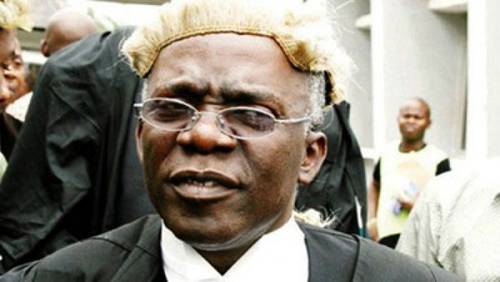A constitutional lawyer and author, Chief Sebastine Hon (SAN), has challenged Mr. Femi Falana (SAN) for saying chief judges are empowered to free prison inmates, insisting that chief judges, including the Chief Justice of Nigeria, have no constitutional powers to embark on prison amnesty.

Hon said such amnesties, including the power of the Attorneys-General to enter nolle prosequi, are deliberately left by the framers of the Constitution in the hands of politicians, to avoid the sacredness of the Judiciary being muddied or messed up with, by permitting Judicial officers, through administrative actions, to order the release of politically-exposed persons from criminal prosecution.
The Senior Advocate was responding to a statement credited to Falana, where he (Falana) stated in a rejoinder to his (Hon’s) earlier position that Chief Judges have powers to order release from prison detention.
He said: “I ordinarily would have kept quiet; but I think the good people of Nigeria need to know better. In other words, Mr. Falana’s reasons for taking that position are, with respect, not known to law. The position itself is completely wrong.
“In the first place, from his language, Mr. Falana has suggested that my press statement on the subject matter targeted the recent prison releases made by the respected Chief Judge of Lagos State. How wrong he is! Nearly all the State Chief Judges have at one time or the other undertaken this exercise. I do not entertain sentiments when interpreting the Nigerian Constitution.”
According to him, Falana, after admitting that he had relied on sections 35(4), 175 and 212 of the Constitution, further shockingly stated thus: “It is curious to note that in the press statement credited to Mr. Hon no reference was made to the relevant laws on the subject matter.”
“What, in his judgment, is more ‘relevant’ than the Constitution of Nigeria – the fons et origo (source) of all laws?” Hon queried.
The constitutional lawyer said Falana is the person who is running away from the Constitution and taking refuge under laws that are lower to the Constitution!
He insisted that it was wrong to say that state chief judges have never granted pardon to convicts or criminal suspects awaiting trial before.
His words: “Another shocking submission made by Mr. Falana is that since the Prisons Act, 2004 and the Criminal Justice (Release from Custody) (Special Provisions) Act fall under Item 8 of the Exclusive Legislative List of the Constitution, they are constitutional!
“I quote him: ‘Since prison is item 48 in the Exclusive Legislative List in the first schedule to the Constitution of the Federal Republic of Nigeria, 1999 as amended, it is undoubtedly clear that both the Prisons Act and the Criminal Justice (Release from Custody) Act cannot be said to be inconsistent or (sic) impugned on ground of inconsistency with the Constitution.’ This is my first time of hearing this constitutional theory! Listing of legislative items under the Legislative Lists is only intended to draw the line, in a federal setup like ours, between what the Federal Government on the one hand and the federating States on the other hand have competence to legislate on and is not a licence to enact unconstitutional legislation.
“The Constitution cannot under section 1(3) be providing that an Act or a law will be unconstitutional if it conflicts with the Constitution and at the same time, under the Legislative Lists, be saying the opposite of this. And before we forget, it was the same Mr. Falana, SAN, who a couple of weeks ago stated that the provisions of the EFCC Act which required confirmation by the Senate of the appointment of the EFCC Chairman, were unconstitutional. Was the EFCC Act not made pursuant to the powers granted by the Constitution in the Legislative List?”
Hon maintained that section 35(4) of the 1999 Constitution has covered the field on what should be done to any person accused of an offence; and there is no room for any administrative action by the Judiciary.
Only judicial actions, he said, can lead to the release of detained persons, hence any administrative action, apart from the one in sections 175n and 212 will be directly in conflict with the said section 35(4).
“Finally, if Chief Judges are permitted to release persons from custody, what is the legal implication of that action? Do the detainees get the reprieve of pardon that only the President or the Governor can grant? No! They are merely released, while the charges against them are pending!
“What then happens to those charges, judging from our Constitution or even the Acts cited by Mr. Falana, SAN? Nothing! But if the President or a Governor grants pardon, section 36(10) of the Constitution comes in handy to erase the conviction or even accusation in view of the phrase ‘concerned with an offence in sections 175 and 212,” he stressed.
By Chinyere Obia
